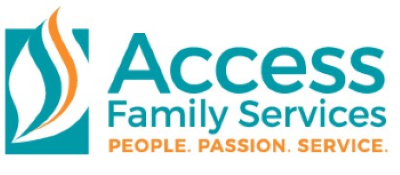Foster Care Program
Overview:
Access Family Services provides an array of foster care and specialized family treatment, including family foster care, therapeutic foster care (TFC), intensive alternative treatment (IAFT), rapid response crisis beds (RR), enhanced therapeutic foster care (E-TFC), and B-3 Crisis Overnight Respite. Services are delivered in licensed foster care settings. Treatment is focused on reunification with family or other permanency options. A homelike environment is proven an effective alternative to residential treatment centers for many youth presenting with interfering behavioral, and emotional challenges.
Goals:
- Develop a better understanding of the family unit, family member roles, and specific skills to improve the ability to function and interact as a responsible family member.
- Ensure safety and health.
- Improve individual and family functioning.
- Improve decision-making skills, encourage positive social behavior, and reduce interfering behaviors.
Program Highlights:
- Each child is closely matched with a therapeutic foster family that meets the needs of that child.
- Our treatment parents are pre-qualified and have received over 40 hours of training. Each home is licensed by the Department of Social Services.
- Youth benefit from a home environment and community-based setting while receiving evidence-based clinical services from a team of professionals working collaboratively to meet each child’s unique needs.
Program Design:
- Treatment is provided in a specialized foster care setting, and supported by qualified program staff.
- A professional assessment is completed to determine individualized goals and interventions.
- The youth receives treatment in a warm and supportive family environment from treatment parents who have received special training in evidence-based practices.
- Foster families are treatment team members, and principal agents of change in the treatment process, providing daily interventions with the child.
- Shared parenting between the treatment family and family of permanence is an integral component of the treatment process.
Entrance Criteria:
- Family Foster – Serves children age 0 to 20 years. There may be a history of trauma and other troublesome childhood events. This child is provided parenting, structure and a stable environment.
- Therapeutic Foster Care – Serves children age 0 to 20 years of age. This service provides a structured and supervised environment and daily interventions directed at helping the youth acquire the skills necessary to to improve level of functioning and to achieve and/or to maintain the most realistic level of independent function. Foster parents receive supervision and support from foster care program staff at least weekly.
- Intensive Alternative Family Treatment (IAFT) – Serves children age 0 to 20 years of age. This program serves children who have not been successful at other levels of care. Child and family therapy is provided principally in the natural environments of the child. The child’s treatment team meets weekly. The family of permanence participates in weekly team meetings, therapy, and shared parenting. This setting has a higher level of consultative and direct service from psychiatrists, therapists, medical professionals and mental health professionals.
- B-3 Respite – Serves children age 0 to 18 years of age. This service is currently provided to Trillium recipients only and is limited to up to 14 days or less, unless extended by the MCO. B-3 respite provides crisis stabilization, supervision 24/7 and transportation to clinical and psychiatric appointments.
- Rapid Response Crisis Beds – Serves children age 0 to 20 years of age. This service is currently provided to Alliance recipients and limited to 14 days, unless extended by the MCO. Rapid Response provides crisis stabilization, supervision 24/7, risk assessment, person-centered planning, and transportation to clinical and psychiatric appointments.
- Enhanced – Therapeutic Foster Care- Serves children age 0 to 20 years of age This service is currently served among Cardinal recipients with co-occurring behavioral health challenges. The youth is served in a therapeutic home, and includes Family Centered Treatment, an evidence-based practice, delivered in the home by a licensed clinician who engages the family of permanence in the therapeutic process. Length of stay is based on continued care needs.
Referral/Contact:
Contact the regional office closest to you to obtain services. Basic information will be gathered and you will be given an initial appointment. If you prefer to complete the contact information on our website, you will be contacted directly by our intake staff.
